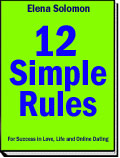 |
|
|
|
WHY ANGER IS ESSENTIAL TO
HEALTHY RELATIONSHIPS?
|
by Kevin B. Burk (c) 2005, Kevin B. Burk, All Rights Reserved. http://www.EveryRelationship.com
Anger isn't nice. Anger isn't polite. And anger certainly isn't our friend. Anger can be all of these things. But anger is also useful, necessary and even healing. We need our anger. We simply need to learn how to express our anger in appropriate, conscious, supportive ways. On its own, anger is neither good nor bad. It can be used to hurt, or it can be used to heal. It may not be a particularly pleasant emotion, but it's an important one. And anger-or rather the skilful use and understanding of anger-is essential to creating healthy relationships. Guy Williams, a friend of mine who also happens to be a minister of Religious Science offers a tremendously insightful approach for understanding anger. Guy says that anger arises from a communication not delivered or an expectation not met. Anger is actually a tertiary response: our initial responses are grief and fear. First, we grieve the death of the expectation that was not met. Next, we fear that things will never change. Finally, we experience anger. So few of us recognize that anger can be a positive, healing response. When we allow ourselves to experience anger, it focuses our minds, and strengthens our resolve. We discover reserves of strength and power. Our anger is what gives us the courage and the power to confront our fear that things will never change, by creating change. So many of us equate anger with aggression. We believe that when we experience anger, someone will be hurt. In order to create a more spiritual and skilful relationship with anger, it's helpful to recognize that we can defend ourselves without attacking. Consider that we each carry a sword. When someone crosses a boundary, we experience anger (because our expectation that our boundaries will be respected was not met). At this point, we have a choice. We can choose to use our sword to attack, lashing out at the person who crossed the boundary. This will inevitably violate our partner's boundaries, and make our partner feel unsafe and angry. They will, in turn, pull out their sword and begin to attack us in earnest. The result is a classic "lose-lose" scenario, where both participants are wounded and feel less safe than they did at the start. We do have another choice, however. We can choose to use our sword to defend our boundary by simply removing it from its sheath and displaying it. Brandishing our metaphorical weapon is usually more than sufficient to hold the attention of the person who crossed the boundary. Once we have our partner's attention, we can calmly make them aware that they have crossed a boundary, and ask that they take a step back and respect that boundary in the future. Because we are merely defending ourselves and not attacking our partner, we are far less likely to make our partner feel unsafe, which in turn means our partner is far more likely to apologize for having unintentionally crossed a boundary. It's a "win-win" situation because we feel safe once again in the expectation that our boundaries will, indeed, be respected, and our partner feels safe because they are now more aware of the boundaries in the relationship, and no longer need to fear that they will accidentally violate them. If we choose not to take things personally, and always assume that the boundary violation was unintentional, we not only avoid stepping into the role of victim, but we also avoid the need to forgive our partner, because we never blamed them in the first place. Avoiding blame, by the way, is another way that we defend ourselves without attacking. When we blame someone for their actions, we are, in fact, attacking them. We cut them off from the flow of our love. This makes them feel less safe, and frequently is interpreted as an attack. More importantly, when we blame someone, we reinforce the lie that we are separate from All That Is, and cut ourselves off from the universal flow. So how is anger essential to healthy relationships? Remember that relationships are all about meeting our fundamental needs. In every relationship, we need to feel safe and we need to feel validated. As long as those needs are met, our relationships are truly amazing. When we feel angry, we know something is not right. We become acutely aware that some of our needs are not being met. Anger is most often associated with safety violations. If we feel angry because our validation needs are not being met, it's usually an indication that we have an attachment to meeting our validation needs-a sign that one of the main ways that we feel safe is to feel validated. When we feel angry in our relationships, we usually respond in one of two ways. The first response is to express our anger, most often by lashing out in some way. We've already seen how this is always a lose-lose proposition. The second response is to repress our anger in order to avoid a full-out confrontation. (Notice how this response also assumes that the only other way to deal with anger is to express it by attacking!) When we repress our anger, we attempt to restore the balance in our safety accounts by isolating ourselves and disengaging from the relationship. Eventually, we will no longer be able to repress our anger, and it will manifest in a confrontation of unexpected and inappropriate intensity. Neither response meets our relationship needs, of course. When we cultivate a more skilful relationship with anger, however, we have a third option. When we feel angry in a relationship, we can become aware that we're feeling unsafe, that some expectation has not been met, and that our needs are not being met. We can own this experience, recognizing that it's about us, not about our partner. And we can choose to take appropriate action. Instead of attacking or withdrawing, we can choose to engage in the relationship more fully. Before we engage in the relationship, however, we must first recognize that we're feeling unsafe, and remedy this. We may be able to shift our awareness and restore the balance in our safety account in an instant. We may need to disengage (briefly) so that we can cool down before we reengage in the relationship. Whatever the method, it is essential that we feel completely safe before we proceed. If we don't feel safe, we won't behave in a reasonable or rational manner. Once we feel safe, we can explore why we felt angry. Remember, anger arises because an expectation was not met, or a communication was not delivered.
Now that we've identified the reason for the anger response, we can consider it objectively. The most important question is whether our expectations were reasonable. Remember that we are responsible for meeting our minimum daily requirements of safety and validation on our own. When our unreasonable expectations aren't met, we do experience anger, but that anger is a call to make us aware that it's time to adjust our expectations, and this does not involve our partner in any way. If we discover that our expectations are, in fact, reasonable, and that our partner is responsible, then it's time to defend our boundaries and hold our partner accountable. Holding our partner accountable, however, is not the same thing as blaming our partner, yelling at our partner, insulting our partner, "tearing our partner a new one," or in any way making our partner wrong. It's important to recognize that much of the time, all that we need is an acknowledgement that our partner has not met an expectation, and an apology. All we need in order to feel safe again is to be able to believe that our expectations will actually be met in the future. This may seem hard to accept - how could a simple apology ever be sufficient? It's something each of us has to experience for ourselves. The desire for punishment or revenge exists because we have disengaged from our relationships, and we believe that our partners are responsible for meeting our safety needs. When we take responsibility for restoring our sense of safety and choose to engage in our relationships, all we need is an apology - an acknowledgement of the boundary violation - and then forgiveness comes naturally.
ABOUT THE AUTHOR: Kevin B. Burk is the author of The Relationship Handbook: "How to Understand and Improve Every Relationship in Your Life". Visit http://www.everyrelationship.com for a FREE report on creating AMAZING Relationships. Do you
have an article we could publish? We want to hear from you! READ ALSO:
The Perfect Wedding Budget - By Gerry Huwaljik. While the thought of planning a wedding within the boundaries of a budget can bring tears to a bride, knowing how to do some special planning can dry those tears and bring a joyous delight. Find out what and how you can prepare your wedding with and without. Keeping A Marriage Romantic - By Alan Detwiler. A survivor guide to keeping your marriage alive and more romantic than ever. Are you desperate enough? - Today a reporter phoned me and among many others, asked this question: Is it true that it's mostly desperate people that are using Russian dating websites? Would you like to know what I answered? Then read on... How To Read A Face Like A Book! - By Kathy Thompson. What do features of your face tell about you? Face Reader, Kathy Thompson reveals it all. JUST RELEASED! New
E-book by Elena Petrova: Comment from the
reader:
Find out once and forever what Russian women are really looking for, why they are looking for it and how you can give them exactly what they want! With "How To Find And Marry A Girl Like Me" you'll learn knock-out techniques that will instantly boost your success rate in dating Russian women - online and in real life. You will have more beautiful girls that want to be with you than you can handle! And not just ordinary girls! They will be beautiful, intelligent, but most of all - honest and sincere! You will be the one to take your pick! STOP wasting your time and money in search for a Russian wife... Get it done - painlessly, easily, and certainly! Moreover, have lots of fun along the way! Yes, you too can marry a girl like the one on the picture... Click here!
|
||||||||||||||||||
































